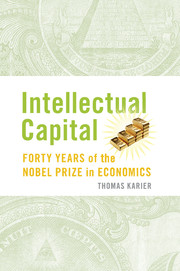Book contents
- Frontmatter
- Contents
- Preface
- Economic Nobel Laureates
- 1 An Economic Prize
- 2 Free-Market Economics
- 3 Micro: The Chicago School
- 4 Stock Market Casino
- 5 More Micro
- 6 Behaviorists
- 7 Keynesians
- 8 Classical Revival
- 9 Inventors
- 10 Game Geeks
- 11 General Equilibrium
- 12 A World View
- 13 Numbers Guys
- 14 History and Institutions
- 15 Reshaping the Prize
- Notes
- Index
14 - History and Institutions
Published online by Cambridge University Press: 10 November 2010
- Frontmatter
- Contents
- Preface
- Economic Nobel Laureates
- 1 An Economic Prize
- 2 Free-Market Economics
- 3 Micro: The Chicago School
- 4 Stock Market Casino
- 5 More Micro
- 6 Behaviorists
- 7 Keynesians
- 8 Classical Revival
- 9 Inventors
- 10 Game Geeks
- 11 General Equilibrium
- 12 A World View
- 13 Numbers Guys
- 14 History and Institutions
- 15 Reshaping the Prize
- Notes
- Index
Summary
The Nobel committee has been so focused on rewarding economics that projects a scientific and mathematical image that it has often ignored more practical, historical, or institutional approaches. There have been exceptions, including two economists who focused on an institutional topic called economic governance. Oliver E. Williamson, a co-winner in 2009, explored the narrow question of why some activities are included within a firm and others are not. The answer to this question requires a deeper understanding of transaction costs.
An entirely different issue caught the attention of his co-winner, Elinor Ostrom, the first woman Nobel laureate in economics. Ostrom was interested in solutions to environmental problems known as common-pool resources. Economists had previously suggested solutions to this problem but they had largely overlooked the role of voluntary cooperative organizations. She found that cooperation, not competition, could sometimes provide a reasonably efficient outcome. Both of these Nobel laureates were more interested in institutional arrangements either within firms or within cooperative organizations, and both were linked to the prior work of Nobel laureate Ronald Coase.
The other two Nobel Prize winners in this category, Robert W. Fogel and Douglass C. North, won Nobel Prizes in 1993 for their work in economic history. Both used economic theory and techniques they learned from Nobel laureate Simon Kuznets to explore unsettled historical questions. The answers they found often surprised other economists and historians. In other respects, the two economic historians had different ideas and sometimes reached different conclusions.
- Type
- Chapter
- Information
- Intellectual CapitalForty Years of the Nobel Prize in Economics, pp. 283 - 299Publisher: Cambridge University PressPrint publication year: 2010



